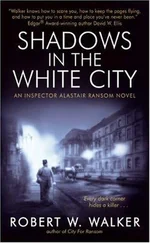Then the two of them chatted about nature and forgot all serious matters.
The next day Klaus departed.
Then winter arrived. How strange: Time marched right past all good intentions just as surely as past the bad qualities one hasn’t yet overcome. There was something beautiful, accepting and forgiving in this passage of time. It swept past both the beggar and the president of the Republic, the strumpet and the lady of refinement. It made many things appear small and unimportant, for it alone represented the sublime and the grand. What could life’s hustle and bustle signify, all those stirrings and strivings, compared to this loftiness that paid no heed to whether a person became a man or a simpleton, and found it a matter of indifference whether or not one desired what was right and good. Simon loved to hear the rustle of seasons overhead, and when one day snow flew down into the dark, black alleyway, he felt joy at seeing the progress of eternal welcoming nature. “Nature is snowing, it’s winter, and, fool that I am, I believed I wouldn’t experience another winter,” he thought. It seemed to him like a fairy tale: “Once upon a time there were snowflakes that, not having anything better to do, flew down to earth. Many of them flew into the field and remained lying there, others fell upon rooftops and remained lying there, and yet more and different ones fell upon the hats and caps of the rapidly hurrying people and remained lying there until they were shaken off, and a few, a very few, flew into the loyal dear face of a horse that stood hitched to a cart and remained lying upon the horse’s long eyelashes, one snowflake flew in through a window, but what it did there is something no one knows, in any case it remained lying there. In the alley it’s snowing, and in the forest high up on the mountain — oh, how beautiful it must be now in the forest. A person could go there. With any luck it’ll still be snowing in the evening when the lanterns are lit. Once there was a man who was all black, he wanted to wash, but he had no soapy water. As he now saw that it was snowing, he went out into the street and washed with snow water, which made his face as white as snow. This was something for him to boast about, which he certainly did. But he got a cough and now he was constantly running around coughing, for one entire year this poor man was forced to cough, until the next winter came. Then he ran up the mountain until he was sweating, and still he was coughing. His coughing just wouldn’t stop. Then a small child came up to him, it was a beggar child with a snowflake in its hand, the flake looked like a small, delicate flower. ‘Eat the snowflake,’ the child said. And now this big man ate the snowflake, and his cough was gone. Then the sun went down and everything was dark. The beggar child sat in the snow and yet didn’t freeze. At home it had been given a beating, it didn’t know what for. It was just a little child and didn’t know anything yet. Even its little feet weren’t cold, and yet they were bare. In the child’s eye a tear was glistening, but it wasn’t yet clever enough to know it was crying. Perhaps the child froze to death during the night, but it felt nothing, felt nothing at all, it was too small to feel anything. God saw the child, but this did not move Him, He was too big to feel anything—”
These days Simon was forcing himself to leap out of bed early despite the wintry cold that reigned in his room, even if there was nothing in particular he had to do. Then he’d simply stand there, gritting his teeth, waiting for an occasion for action to present itself. There was always something or other to do. After all, he could always while away the time by rubbing his hands or back, or else try walking across the floor on his hands. He always had to be exerting his will in some way, even in the most ridiculous fashion, as this drove away thoughts and steeled and enlivened the body. Every morning he washed in cold water from top to bottom until he was glowing, and he didn’t deign to put on a coat before going out. This season he intended to teach himself to ward things off! He used his coat to wrap his feet in when he sat at the table reading. He acquired a pair of bulky, sturdy shoes such as recruits wear in the military so he could wade up the mountain in the deep snow at any time. That would teach him to so much as glance at elegant footwear. With such a solid pair of shoes, one stood twice as firmly in the world. The main thing now was to keep one’s feet on the ground and stand firm. If he could just keep his head high, something was sure to turn up for him of its own accord, something proper he could grasp hold of. Starting over from the beginning, even if it was for the fiftieth time now, what did it matter. As long as his gaze and mind remained alert, the thing he needed was sure to come.
These days he resembled a person who’d lost some money and was exerting the full force of his will to get it back, but besides exerting his will was doing nothing else to this end.
Around Christmastime he went walking up the slope of the mountain. It was getting on toward evening and terribly cold. A biting wind whistled about people’s noses and ears, which grew red and inflamed from the cold. Simon automatically chose the path that once had led to Klara’s woodland home and now had been cleared and widened. Everywhere the trace of transforming human hands was visible. He saw a large but nonetheless charming building on the very spot where the wooden chalet used to stand that he’d gone into so often when Kaspar was still painting there, with the dear, peculiar woman living in it. Now a health resort had been established there, and it appeared to be quite popular, for any number of well-dressed people were going in and out. Simon spent a moment considering whether he too should go inside, but the bitter cold alone was enough to make the thought of a warm room filled with people agreeable. And so he went in. The warm acrid smell of fir twigs engulfed him, the entire large bright room, practically a ballroom, was trimmed and lined with fir branches, all but wallpapered with them. Only the proverbs painted on the white walls had been left exposed, and one could read them. At all the tables sat gay and solemn people, many women, but also men and children, seated singly at round little tables or else clustered in groups about a long table. The smell of the drinks and food combined with the yuletide scent of pines. Prettily dressed girls walked around, serving the guests in a friendly and at the same time utterly unhurried way that had nothing at all waitressly about it. It looked as if these enchanting girls were only waiting on table here as part of some smiling game, or as if they were merely providing this service to their parents, relatives, brothers, sisters or their children, for it all looked so parental and filial at the same time. A small stage that was also thickly framed with fir twigs stood at another end of the hall, perhaps intended for the performance of some Christmas play or a skit with some other charming content. In any case, it was a warm, friendly, hospitable-looking room, and Simon sat down alone at a round little table, waiting to see whether one of the girls would come over to him to ask what he desired. But for the time being none of them came. And so he remained sitting there quietly at the little table for quite some time, propping his chin in his hand as young men are wont to do, when suddenly a slender tall lady approached him; she gave him a friendly nod, and then, turning to one of the girls with an exclamation, asked how this young man could have been left sitting here for so long unattended. This reproach was delivered in manner more kind and laughing than serious, but in any case this lady was a sort of director or manager or whatever it was called.
“Please forgive us for leaving you alone so long,” she said, turning back to Simon.
Читать дальше












